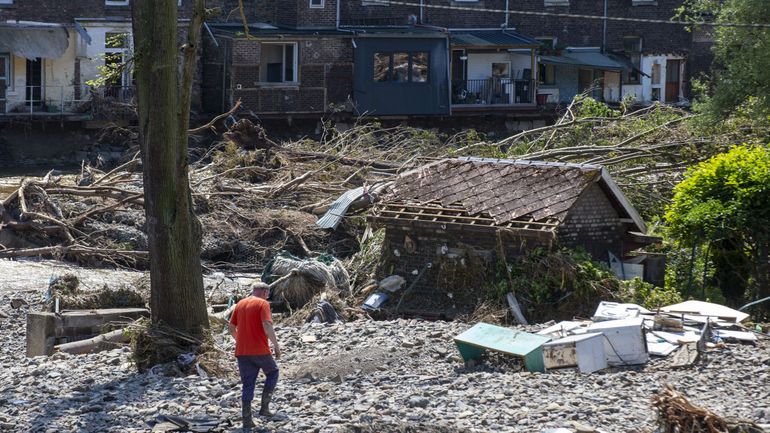Exactly one week after heavy rainfall and deadly floods affected many parts of Belgium, the damage it caused in the most affected regions is becoming more clear.
Until now, rescue operations have been ongoing and the focus has been on clearing debris, which made mapping the damage difficult, but as of Wednesday, several communes who were particularly badly affected have said thousands will be left looking for a new home.
"The scale of the work is colossal, it will take years to rebuild, to heal the enormous psychological wounds," the municipality Trooz, which received help from the military during the worst of the flooding, said in a press release.
"Despite the thousand volunteers who have been working in the town for almost a week, and despite the extraordinary outpouring of solidarity, the scale of the task is going to be Herculean," it read, adding that the work has further been impeded by the computer servers being drowned.
Tens of thousands affected
In Trooz, just under one in two, around 4,000 people, have been badly affected by the floods, and around 600 people have been rehoused so far.
Whilst the local authorities are putting in place a whole series of concrete aids and practical information for its stricken citizens, it is also calling for the mobilisation of provincial, regional and federal authorities.
"Mental health, housing, infrastructure, public works, waterways, security, etc. many competencies spread over the different levels of government are involved. The municipality of 8,749 inhabitants is completely devastated," the press release added.
A temporary curfew has been introduced from 11:00 PM to 6:00 AM.
Related News
- Minister: East Flanders province must review plans to drain polder area
- Politicians ignored warnings about flood risk for decades, climate expert says
- Flood-hit areas could now face spread of infectious diseases
- Walloon government frees initial €2 billion for reconstruction after floods
The municipality has been the testing location for the Red Cross' free food distribution system, through which it will be providing an estimated 10,000 families in the disaster area with two hot meals a day, according to reports from VRT News.
Meanwhile, in Verviers in the province of Liège, which was one of the most worst affected regions, around 10,000 residents have to look for a new place to live, whilst in neighbouring Pepinster, some 2,000 people would have to find new accommodation.
Most residents are also without electricity, water or gas, and many of the locals' cars have been destroyed by the impact of the floods.
In Halen, in the province of Limburg, which was also badly affected and where the dyke of the Maas almost broke, the streets have finally reopened to traffic as the clean-up operation is ongoing.
Since Wednesday evening, the death toll as a result of the floods stands at 32, and all the victims have now been identified by the federal police, according to the latest news from the Crisis Centre.
Another 18 people are still missing, and although police services are continuing their rescue and search missions, the chance of still finding survivors among the debris is now all but non-existent, according to Alain Remue, head of the country’s missing person unit.

